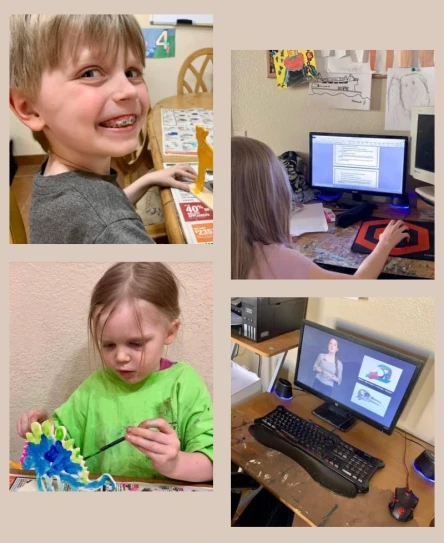Am I Qualified to Homeschool?

One of the most common criticisms I hear from those that oppose homeschooling or believe there should be more restrictive homeschooling laws is: most parents are not qualified to teach their kids. It seems strange to me that they think our children are better off in the very institutions that supposedly did not educate us well enough to teach what we learned. I even had one person insist to me that a parent should not homeschool if they aren’t an expert in every subject. Maybe you even doubt your own ability to give your children a good education or struggle to answer those that question your qualifications. There are many arguments that could be given in support of a parent’s right to homeschool. We could point to statistics that show homeschoolers generally achieving over their public school peers. We could point out the many successful adults today who were homeschooled as a child. But in this post, I’m going to give three simple arguments for why YOU are qualified to homeschool.
1. You are qualified to homeschool because you are the parent.
Parents are their children’s educator by default. You are not only your child’s first teacher, but their primary teacher. This is still true even if you decide not to homeschool. The difference is that your job becomes much harder when your child is away from you for extended periods of time. The question you must ask yourself is: do you want to give up your influence on your child and rely on strangers for their development?
You may ask, “But what about the things I don’t know?” Did you know all there was about parenting when you had your first child? Maybe you thought you did, but looking back it’s a resounding “no!” Probably, you spent a good deal of time researching everything from the best diapers to potty training to nutritional foods. Homeschooling is a continuation of that process. Perhaps homeschooling should just be called “parenting.” You will spend time researching curriculum, brushing up on things you forgot, and learning things you never knew. Like any aspect of parenting, it’s hard work but rewarding. You will be blessed with a close relationship with your child and the joy of watching all their “firsts”—not just first words and steps, but the light in your child’s eyes the first time they read.
But you don’t have to know everything right now. Homeschooling is more than a parent teaching a child what they know, but instilling in the child a lifelong love for learning. A child who loves learning is a child who will seek out knowledge above and beyond what their parents teach them.
Science isn’t my strong suit. I enjoy it, but I’m certainly no expert. Not long ago, I went through Properties of Atoms and Molecules with my two oldest children. I hadn’t read beyond the first couple of paragraphs when my son jumped up and ran off, coming back with a book on elements. He opened it and began teaching me and my daughter about the periodic table. The pure joy on his face and enthusiasm was contagious. He already knew more about the topic than I. Moments like that are the moments that make all the struggles worth it.
As a homeschooling parent, I’m not trying to teach my child everything I know, I’m trying to instill in them a lifelong love for learning. A child who loves learning is a child who will seek out knowledge above and beyond what their parents teach them.
2. You are qualified because you aren't doing this alone.
Homeschooling isn’t a parent struggling alone. Sometimes the way people talk about homeschooling gives me the impression that they think we live in a cave and are scrawling petroglyphs on a wall. Today there is a wealth of resources, curriculums, online classes, and homeschooling groups. If there is something that you do not know, there are plenty of sources you can reach out to for help. Ideally, you have the support of family and friends, but even if you don’t there are other homeschoolers out there willing to give you a hand. Find those that share your educational values, whether online or in person, and build a support group.
Math comes easy for me, and I have one friend I sometimes help with those tough arithmetic questions. She, however, is experienced homeschooling a child who has dyslexia. If I have a grammar question, I can reach out to my sister. In addition to family and friends, I’m members of several online homeschooling groups. Sometimes the best support is just an encouraging word from another homeschool mom when you’re having a rough day.
Inevitably, you will get asked the big “socialization” question. Homeschooling doesn’t mean being shut up in our houses day after day. We visit libraries, observatories, and museums, take a day off to hike with friends or explore the zoo and aquarium, or we might get involved in sports or join a club. Our children make friends and socialize, not just with peers, but people of all ages. We don’t have our children locked up in a basement or forbid them from going outside or making friends. That’s child abuse. Lumping us in with those “homeschoolers” is no fairer than lumping every teacher in with those that abuse their students.
Homeschooling isn’t a parent struggling alone. There are other homeschoolers out there willing to give you a hand.
3. You are qualified to homeschool because you want what's best for your child.
Homeschool parents like any good parent is concerned with their child’s success. We don’t choose to homeschool because we have some twisted desire for our children to fail. Parents have an intimate knowledge of their children. We know their interests, talents, and future dreams. Public education is geared for the masses. It’s designed to give a general education to students with whom those in charge have no relationship or knowledge. Public education is about meeting a graded standard to make the school look successful rather than achieving what the student wants for their life.
As a homeschool parent, you can tailor your child’s education to meet specific goals and life pursuits.
And while some children may do well in a traditional school setting, many do not. Parents often choose homeschooling because the public school was not working for their child. Children are individuals with different needs, not identical products moving down an assembly line. Homeschooling provides an ideal setting for individualized education. You can pick a curriculum that matches your child’s specific learning style, interests, and needs. The child can learn at their own pace, excelling in one area while slowing down in another that needs more review. Some subjects we may forgo altogether.
If my child has no interest in science and math, they probably have no interest in going into a STEM field. It would be a waste of their time forcing algebra on them. If their desire is to be an author, their time would be better spent studying grammar and literature. We live in a society that prioritizes certain knowledge over other knowledge and certain occupations over other occupations. I’m so glad I don’t live in a sterile world without art, music, and literature. I’m so glad I don’t have to force my children to meet someone else’s expectations of what’s important. In homeschooling I focus on honing my children’s strengths rather than hounding them on their weaknesses, so that they can be the best version of the adults God wants them to be.

In homeschooling I focus on honing my children’s strengths rather than hounding them on their weaknesses.
So tell me about yourself? I’d love to hear from you. If you’re new to homeschooling or contemplating homeschooling, feel free to ask questions.
If you’re a veteran homeschooler, be an encouragement to others. Why did you decide to homeschool? How do you answer criticism when it comes? What is your favorite thing about homeschooling?
Check out Understanding Homeschooling: What It is and What It Isn’t.
Thank you for reading. Keeping a blog going, though fun, is a lot of work. If you found this post helpful, consider buying me a cup of coffee. If you haven’t already, you can subscribe for more posts like this one below.
Happy Homeschooling!

Pingback: The Top 7 Reasons Why I Homeschool - Leanna Rapier
Pingback: Understanding Homeschooling: What It Is and What It Isn’t - Leanna Rapier
Pingback: Homeschooling the Dyslexic Child - Leanna Rapier